Podcast Series | 2022-2023 | Episodes 1 – 12
Throughout the COVID-19 pandemic, local food producers, grassroots networks, independent food businesses and social enterprises, and other food frontline actors fed their communities in the face of increased food insecurity, supply chain blockages, and widening social inequities. Research shows the urgent need for knowledge dissemination on local food stakeholders — food security advocates, community gardens, independent grocery stores, farmers, street and market vendors – who have developed and enacted innovative solutions against considerable logistical and social challenges. This SSHRC Connection project combines a newly created web-based archive for outreach with participatory training and knowledge-sharing events.
The online platform features the voices of people active on the pandemic food frontlines, describing their experiences and practices for sustainable food futures. Over 2022-23, the Feeding City lab produced a multi-episode public scholarship podcast series featuring new interviews. Episodes are publicly available on this Feeding City lab webpage, through Spotify and through PodBean. This initiative enhances prior collaborations to connect academic research and local food voices from Canada, the US, the UK, and the global South.
The project team also leads podcasting workshops and multisensory experiential learning sessions. Skill-building events showcase the new multimedia content and its connections to research and teach participants how to use and interact with the archive.
Listen and Subscribe on PodBean and Spotify.
Food Frontline Voices: Pandemic & Beyond Podcast Series
Production Team
Feeding City Lab PI:
Dr. Jo Sharma
Team Lead and Producer:
Dr. Jaclyn Rohel
Student RAs and Interns:
Adam Bishop
Bavan Pushpalingam
Daphne Berberyan
Jasleen Sohal
Rayah Flash
Shathvahi Ramesh
Serena Yuan
Research Credits
Dr. Filippo Oncini collaborated with the Feeding City Lab and facilitated connections with the Manchester (UK) contacts for Episodes 6, 7, and 8. We thank Filippo for his contributions and support for the project.
Sound Credits
Music:
Changing Seasons by Ketsa, licensed with permission from the Independent Music Licensing Collective (https://imlcollective.uk/).
Sound Effects:
In the early stages of series production, our team created some sound effects specific to food and environment and compiled a small in-house sound library.
For later episodes, additional sound effects were sourced from Zapslat (https://www.zapsplat.com), as noted in episode show notes.
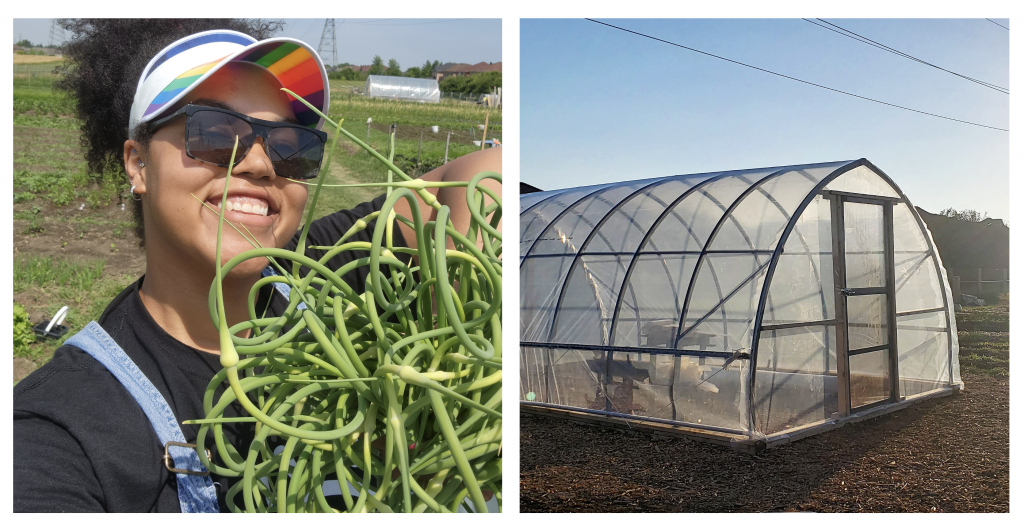
Left: Claire Perttula. Right: Malvern Urban Farm. Image Credits: Claire Perttula
What role could an urban farm play in supporting food security in Scarborough? In this episode, Feeding City’s Serena Yuan speaks with Claire Perttula (Food Justice Projects Coordinator at the Malvern Family Resource Centre) about the Malvern Urban Farm, a two-acre plot nestled between four hydroelectric towers in northeast Scarborough. The farm got its start during the Covid-19 pandemic and is now going into its third growing season. Claire lets Serena in on the ins and outs of farming in the city. She describes how the farm evolved in an underused urban space to include market gardens, a donation plot, a 500 square foot pollinator garden and a solar-powered hoop house. The conversation highlights how the farm helps develop new economic opportunities for community farmers and brings fresh, culturally appropriate foods to Scarborough’s markets. The Malvern Urban Farm Farmers’ Market will return for its 2023 season this July. This interview with Feeding City Lab was recorded on December 18, 2022.
Episode 2 | A Charity Kitchen Tackles Food Insecurity in Scarborough
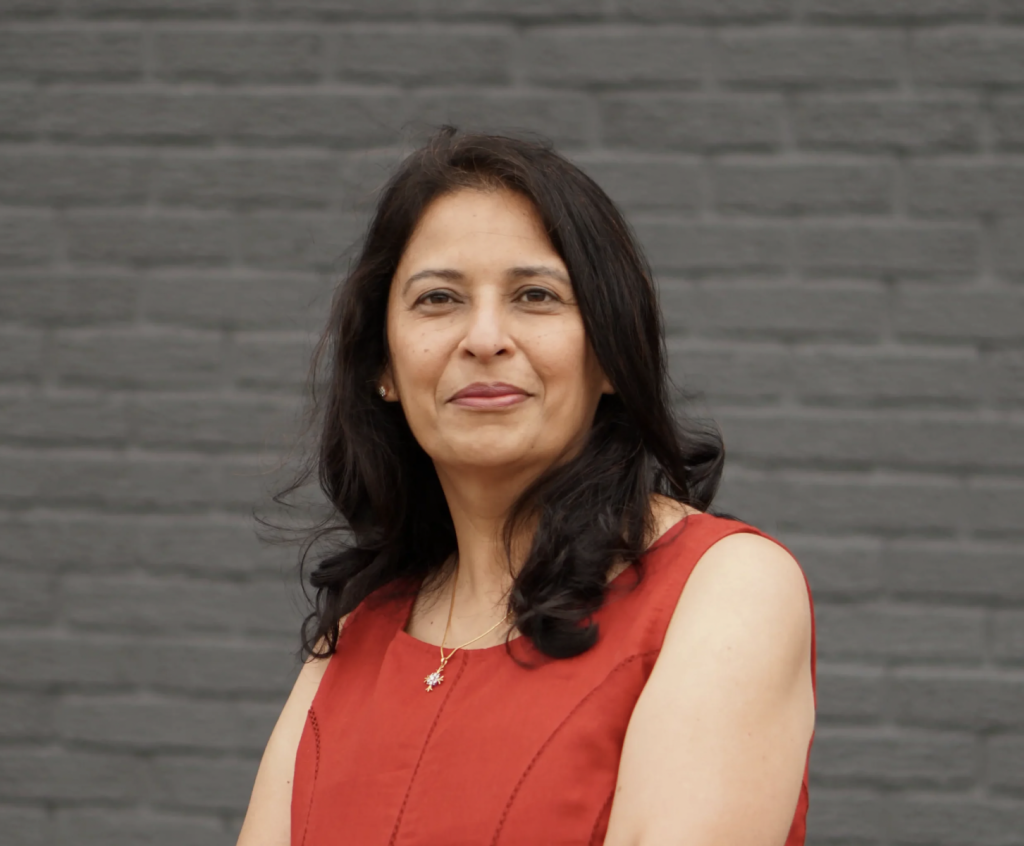
Seema David, 5N2
In this episode, 5n2 founder Seema David talks with Jo Sharma of the Feeding City Lab about her organization’s efforts to reduce local hunger and food insecurity by rescuing food and distributing freshly prepared, warm meals to Scarborough residents in need. Seema offers insight into some of the inner workings of 5n2 during the COVID-19 pandemic, shares the challenges of commercial renting as a food non-profit in Toronto, and elaborates on how localized food networks and community partnerships sustain the work of organizations like 5n2. Listeners will also learn about what’s new for 5n2 nearly a decade after the charity first opened its doors – from a brand-new kitchen space to plans for a fresh vegetable program based on a social enterprise model of sharing food. This interview with the Feeding City Lab was recorded on November 8, 2022 as part of a live event in collaboration with the Great Explorations community engagement series at the University of Toronto Scarborough. In early 2023, 5N2 completed its long search for a new space and settled into its new home in Scarborough Centre.
Episode 3 | Building Toronto into a Market City
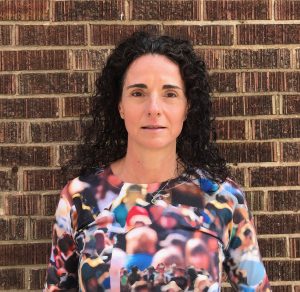
Marina Queirolo
In this episode, Marina Queirolo of Market City TOreveals the ways in which public markets can facilitateshort supply chains within a regional food system, support small and medium retail businesses, and build community. Connecting production and processing with consumption and access, Marina illuminates how a market city can put into action a food distribution system that includes a diversity of seeds, crops, foods, peoples, and cultures. Through a networked approach, a market city model of public food infrastructure bridges neighbourhoods, cities, and regions. Listeners will hear about the many different typesof public markets across Toronto, and their benefits; they will gain insight into some of the biggest challenges that public markets faced during the Covid-19 pandemic; and they will learn how markets help bring resiliency to food systems and what more is needed to help marketsflourish. The Feeding City Lab produced this podcast episode from Marina Queirolo’s plenary talk (“Market Cities: Building the ‘Missing Middle’ in Sustainable Food Systems”), delivered on December 9, 2022, at the Sustainable Food and Farming Futures Symposium at the University of Toronto Scarborough.
Episode 4 | Farmers’ Markets and Food System Resiliency in Toronto

Mike Lawler
In this episode, Feeding City Lab talks with a former market manager about what it takes to build up a farmers’ market in Toronto. Recalling his past experience running the Underpass Park farmers’ market and the Junction farmers’ market in the early months of the COVID-19 pandemic, Mike Lawler offers listeners a peek into two different open-air markets: one that had only recently opened within a new planned community in downtown Toronto, and another that was long established in the city’s west end. Mike shares some of the challenges, pandemic pivots, and successes that he encountered as he discusses the important role that farmers’ markets and small-scale producers play in Toronto’s food systems. The conversation centres the role of the marketplace in community-building, addressing topics that include access and representation, technology and online ordering, and food policy and urban planning. Now a food scholar and PhD candidate at the University of Toronto, Mike reflects on what he thinks needs to happen in Toronto, and beyond, for farmers’ markets to flourish within a commodity food system. This interview with Feeding City Lab was recorded on March 22, 2023.
Episode 5 | Sidewalk Provisions: Street Vending during the Covid-19 Pandemic, and Beyond
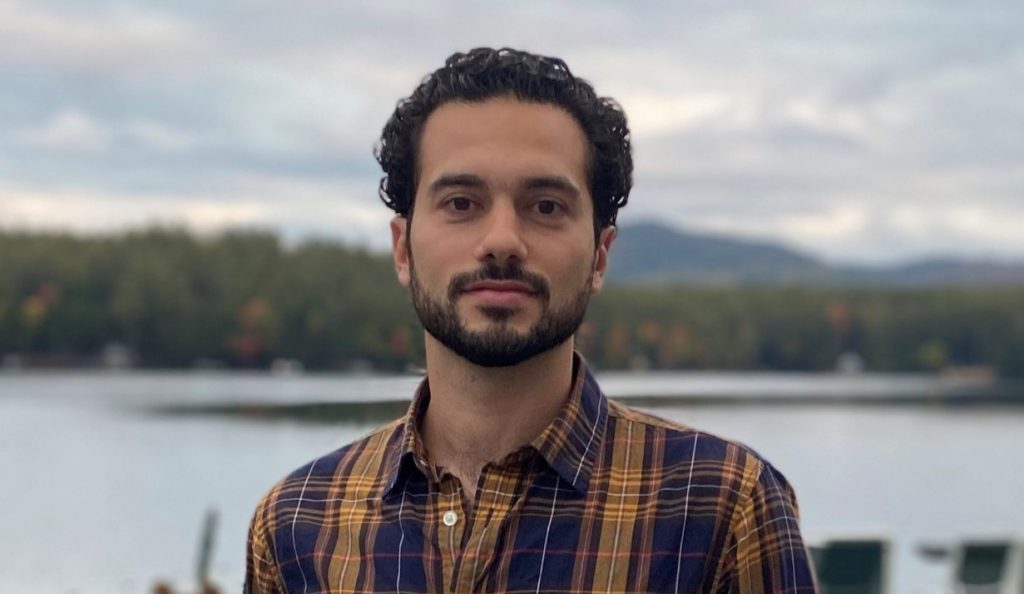
Mohamed Attia
In this episode, Feeding City Lab’s Noah Allison hosts Mohamed Attia of New York City’s Street Vendors Project (SVP) in a discussion on the resiliencies of the street vending industry. Mohamed recounts how he came to join SVP – first as a member when, as a newcomer from Egypt he sold food on the streets of midtown and the Upper East Side, and then as leader of the organization in 2019. By amplifying the voices of street vendors, organizing campaigns, and connecting vendors with small business training, housing resources, and legal services, SVP supports the work of its more than 2800 members and 20 000 vendors on New York City’s streets and sidewalks, the vast majority of whom are immigrants. The conversation offers insight into the economic, social, and cultural contributions of vendors to their local communities. Mohamed shares the challenges and successes of formalizing small food businesses: he explains how the COVID-19 pandemic impacted street vendors, bringing closures but also seeding new businesses; he recounts the 2021 local legislative victory of the “Lift the Caps” campaign to significantly boost the number of vending permits over the next decade, and he sheds light on future goals to reform the street vending industry in New York City. This interview with Feeding City Lab was recorded on January 31, 2023.
Episode 6 | Creating Food System Change with Market Gardens and MUD
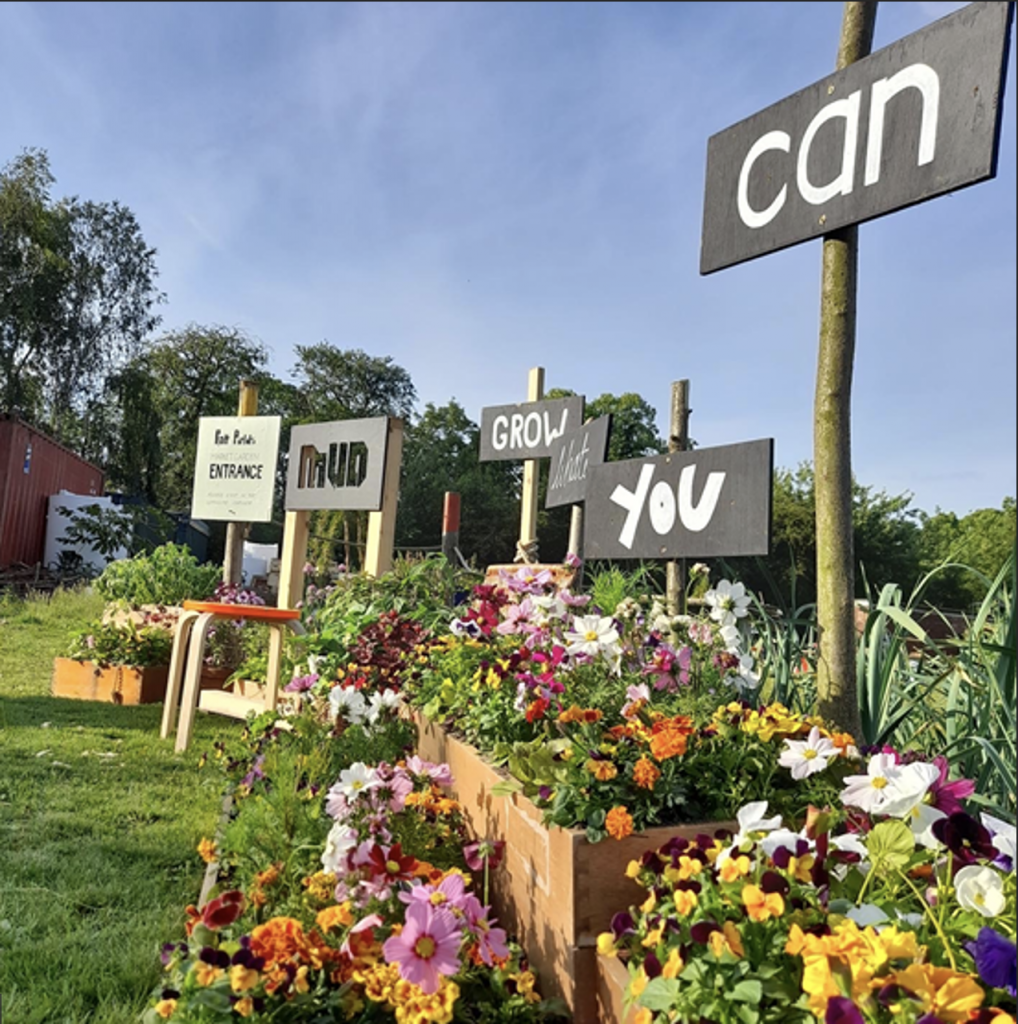
Photo Credit: Sam Payne
What is a community market garden, and what role could it play in a city’s food system? In this episode, Sam Payne describes how he helped launch MUD – short for Manchester Urban Diggers – as a non-profit social enterprise in the months before the Covid-19 pandemic hit. By sowing seeds and bringing people together around an overgrown, disused one-acre space, MUD snowballed into a community-wide undertaking to support food sovereignty in greater Manchester, U.K. Hundreds of people move through the MUD plot each week, volunteering in the gardens and participating in cooking workshops, gardening clubs, pottery classes, and more. This is a story of uniting a community over food through collective acts of educating, inspiring, creating, and feeding during the Covid-19 pandemic. Join the conversation as Sam paints a picture of a community-based alternative to the corporate supermarket. This episode with Feeding City Lab was recorded on March 22, 2023.
Episode 7 | Pantry Provisions and the Covid-19 Pandemic
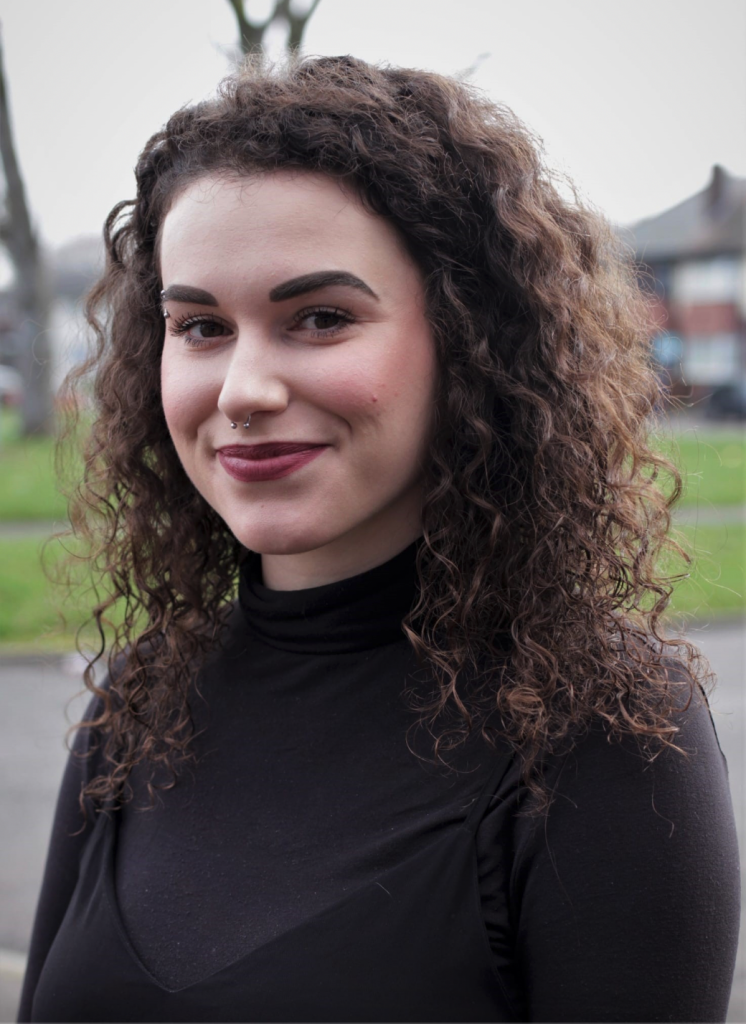
Elena Vacca
A pantry differs from both a food bank and a grocery store, yet each can be connected within a local food network. In this episode, Elena Vacca shares her experience working with Your Local Pantry in Manchester, U.K. during the Covid-19 pandemic. Elena offers insights into YLP’s resilience and adaptability, explaining the unique benefits of the members-based, volunteer-led pantry model. She describes how skyrocketing demand and social distancing requirements impacted the pantries in 2020, from sourcing food to the complex logistical planning that moved 150 parcels through delivery routes each day. She also addresses the recent challenges posed by the cost-of-living crisis and reflects on the potential to collaborate with government to improve food security. Drawing on her grassroots experience on the frontlines at the pantry and on her advocacy work to promote community-based access to healthy food, Elena shares ideas for what’s needed to transition to a more just and sustainable food system. This interview with the Feeding City Lab was recorded on March 22, 2023.
Episode 8 | The Future of Charitable Food Aid
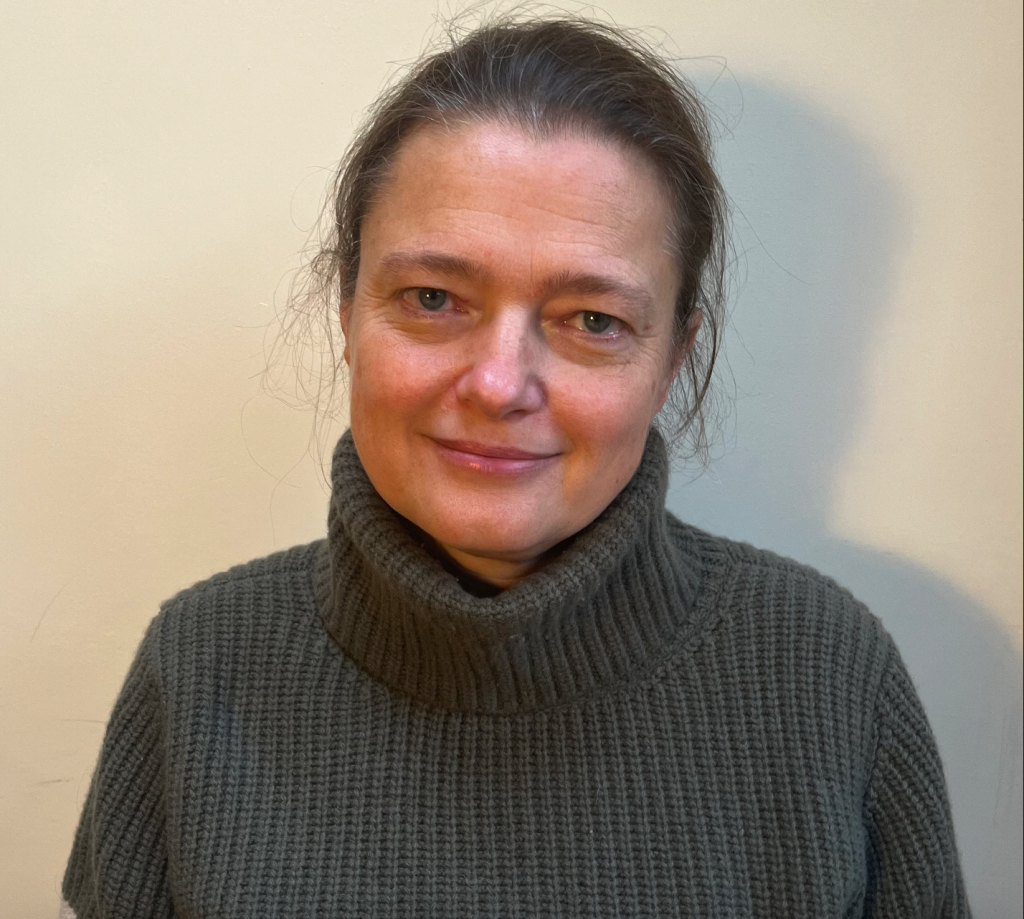
Sabine Goodwin
What role does charitable food aid play in alleviating food insecurity? In this episode, Sabine Goodwin, Coordinator of the U.K.-based Independent Food Aid Network (IFAN), discusses the structural challenges to food access during the Covid-19 pandemic and her work towards a future where there is no need for charitable food aid. IFAN’s membership includes over 550 independent, grassroots food aid providers from England, Scotland, Wales, and Northern Ireland. Describing IFAN’s research, advocacy, and network-building efforts, Sabine shares the successes of the Cash First project, which collaborates with members and local authorities to address widespread food insecurity by providing people with straightforward access to financial resources. The conversation illuminates the impact of poverty as a main driver of food insecurity and describes how community-based charitable supports can promote dignified access to food during a growing cost of living crisis. This interview with the Feeding City Lab was recorded on March 21, 2023.
Episode 9 | Mobilizing Community Partners and Grassroots Networks to End Hunger

Ilham Saydna
Feeding City’s Jasleen Sohal talks with Ilham Saydna, Program Development Coordinator at Toronto’s Daily Bread Food Bank. Ilham shares her journey infood security work, drawing from nearly a decade of experience at Daily Bread and her longtime involvement with the Scarborough Food Network. She explains how a large organization such as Daily Bread supports people in need, shedding light on its community-based partnership model and work with local agencies (such as CICS) and its research and advocacy efforts to end hunger. Despite a broad and resilient food distribution network, need has continued to rise over the past few years due to the Covid-19 pandemic, inflation, and rising costs of living. In the early months of the pandemic, Daily Bread sought to bring emergency food provisions closer to the homes of vulnerable people to improve access. From March-May 2020, it set up food distribution sites at several branches of the Toronto Public Library, which pivoted to serving as food bank facilities during the pandemic emergency. In the following weeks — in June and July of 2020 — Daily Bread launched an astounding 19 new programs to meet soaring demand and fill gaps in communities that were hit especially hard, such as Scarborough. New food banks continue to open every month. Ilham emphasizes that change is possible, and shenotes how the public can get involved in supporting efforts to end food insecurity. This interview with Feeding City was recorded on July 11, 2023.
[Additional sound effects from https://www.zapsplat.com.]
Episode 10 | Supporting Newcomers through a Circle of Community Food Programs
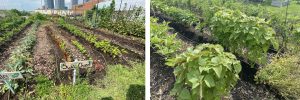
Photo Credit: Jasleen Sohal
In this episode from Voices from the Food Frontlines, the Feeding City Lab takes listeners on a tour of food and urban growing programs offered by the Toronto-based Centre for Immigrant and Community Services (CICS). In conversation with Serena Yuan, Brian Joyce, Director of Community Services, Facilities and Operations at CICS, discusses the organization’s experience during the Covid-19 pandemic. Brian explains how its programs and facilities evolved in response so that it could continue assisting newcomers and refugees. Through food banks, cooking workshops, a new greenhouse, a community collective of raised garden beds, a seed library, and a meal delivery service in partnership with a local cafe, CICS has helped facilitate community food initiatives in the service of well-being, social health, and connection. CICS’ kitchen and garden-based programs continue to grow. It is on track to grow more than 2500lbs of food this year alone, with a range of organic produce and culturally specific vegetables – from gai lan to bitter melon and fig trees – going towards their other programs, including their food bank. The episode concludes with a peek into the organization’s plans for the future and its continued efforts to work towards developing a sustainable model that could be shared with and adapted by other communities. This episode was recorded on June 16, 2023.
[Additional sound effects from https://www.zapsplat.com.]
Episode 11 | Creating Participatory Food Systems through Pop-Ups and Public Markets
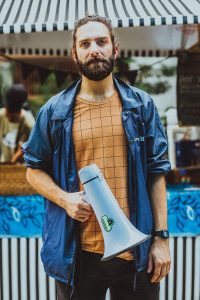
Thiago Gomide Nasser
Feeding City Lab’s Jaclyn Rohel hosts Thiago Gomide Nasser in a conversation on pop-up market infrastructure and community-building amongst food makers, vendors, and eaters. Thiago shares the story of how he came to co-found Junta Local, a Rio de Janeiro-based collective that promotes and distributes good, local, and fair food. As a researcher and an activist, Thiago explains how he bridged his academic interests in political science with grassroots advocacy to support small producers and help facilitate short food supply chains in Brazil. Junta Local first originated as a small market of only 14 vendors set up on beer crates and wooden planks, yet over the past decade it has grown into a resilient network of food producers and markets. Listeners will get a view into Junta Local’s unique participatory structure through its modelo ajuntativo, gain insight into how Junta Local helped support the human links within Rio de Janeiro’s food systems during the Covid-19 pandemic, and learn about how digital platforms can complement on-the-ground marketsplaces. This interview was recorded live at the University of Toronto on June 12, 2023.
[Additional sound effects from https://www.zapsplat.com.]
Episode 12 | Bringing Farmers’ Markets to Underserved Neighbourhoods: A Story from Scarborough
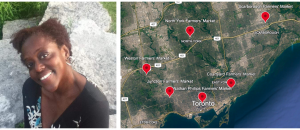
Jennifer Forde and a map of the markets she has managed (past and present) across Toronto
What is the past, present, and future of farmers’ markets in Scarborough? Toronto’s easternmost neighbourhoods have notoriously lacked sufficient access to vital social infrastructure such as public transit, health care, and fresh, healthy, affordable food. In this episode, Feeding City’s Jasleen Sohal talks with Jennifer Forde about food access and farmers’ markets in Scarborough. Jennifer tells her story of growing up in Scarborough’s Malvern neighbourhood and shares what fueled her to lead the way for farmers’ markets in Scarborough. As a seasoned market manager – Jennifer has overseen several farmers’ markets across the Greater Toronto Area – she first helped bring farmers’ markets to Scarborough five years ago, working with small family farms, women-led enterprises, newcomers, and BIPOC communities to make affordable, nutritious, local produce and culturally diverse artisanal products broadly accessible. She reflects on the operational impacts of the Covid-19 pandemic, shedding light on the work of keeping the markets connected to thecommunity and on how the innovations and relationships forged during that time continue to shape Scarborough’s farmers’ markets even today. The episode concludes with a peek into the Scarborough Neighbourhood Fresh Food Pilot, which used marketbucks and a model of the 15-minute city to increase access to farmers’ markets. Listeners can learn more about Jennifer’s markets by visiting https://www.scarboroughfarmersmarket.ca/ and https://www.courtyardfarmersmkt.ca/. This Feeding City conversation was recorded on August 18, 2023 and lightly edited for clarity and length.
[Additional sound effects from https://www.zapsplat.com.]
— End of Pandemic & Beyond Episodes —
Stay tuned for a new sub-series from the Feeding City Lab.
Voices from the Food Frontlines: Sustainable Foodways will be coming soon (Winter 2024)!